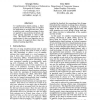Free Online Productivity Tools
i2Speak
i2Symbol
i2OCR
iTex2Img
iWeb2Print
iWeb2Shot
i2Type
iPdf2Split
iPdf2Merge
i2Bopomofo
i2Arabic
i2Style
i2Image
i2PDF
iLatex2Rtf
Sci2ools
105
click to vote
ACL
1996
1996
Efficient Transformation-Based Parsing
In transformation-based parsing, a finite sequence of tree rewriting rules are checked for application to an input structure. Since in practice only a small percentage of rules are applied to any particular structure, the naive parsing algorithm is rather inefficient. We exploit this sparseness in rule applications to derive an algorithm two to three orders of magnitude faster than the standard parsing algorithm.
Related Content
| Added | 02 Nov 2010 |
| Updated | 02 Nov 2010 |
| Type | Conference |
| Year | 1996 |
| Where | ACL |
| Authors | Giorgio Satta, Eric Brill |
Comments (0)

